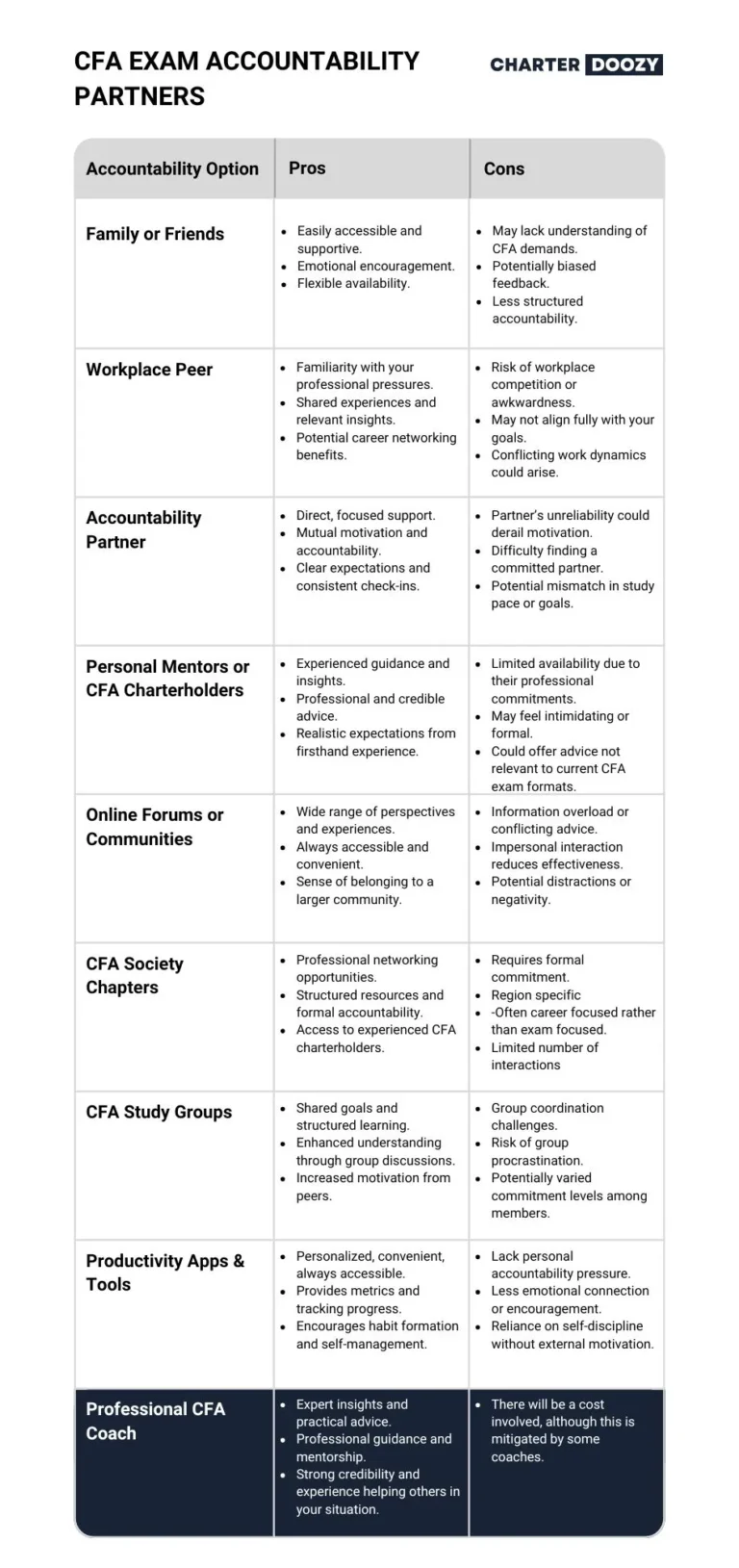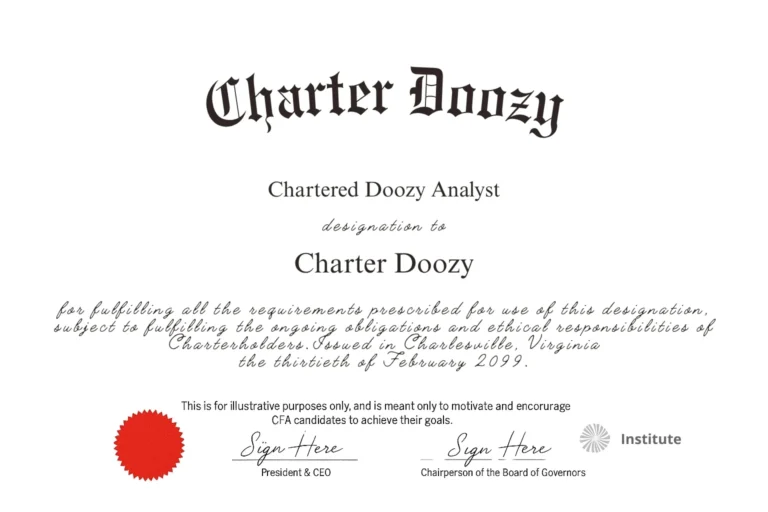Passing CFA Level I is no small feat.
Especially when you’re balancing a full-time job in the fast-paced world of finance.
The demands of work and study can be overwhelming – leaving you feeling like there’s never enough time in the day.
But what if there was a way to enhance your study experience, keep you motivated, and accountable – to increase your chances of passing?
Enter the CFA Study Group.

Why CFA Study Groups Are Game-Changers
The Power of Collective Wisdom
You know what it’s like trying to solve a complex financial problem alone.
You are missing one or two concepts that’s stopping the whole thing ‘clicking’ in your mind.
Trying to get to the bottom of things is a waste of time.
It’s hard work that is mostly unrewarded.
This is similar to adding Specific Risk into your asset portfolio – investors aren’t compensated for risks that can be easily diversified away.
Similarly, you are not rewarded for wasting time trying to understand concepts that could easily be taught.
That’s where a study group can be useful.
Someone in your study circle has likely faced a similar challenge, and knows the solution.
Or at least has more clues to help you both figure it out.
As they say – “Two heads are better than one.”
That’s the power of collective wisdom.
You’re not just relying on your own understanding – you’re tapping into a wealth of knowledge from peers who bring different perspectives and expertise to the table.

Study groups create an environment where complex topics can be broken down and discussed until they are understood by everyone.
Whether it’s a tricky statistical concept or the nuances of financial reporting, having multiple brains working together increases the likelihood of grasping difficult concepts.
But it’s more than that.
I mean, a YouTube video, ChatGPT query, or a good set of notes can help you quickly understand CFA concepts.
I found that the real power of studying with others is identifying shortcomings in my own understanding which I wasn’t even aware of.
These blind spots can lead to a major loss of marks on the CFA exam.
Because you “don’t know what you don’t know” – you never actually ask the questions you should be asking.
Trust me – you don’t want to find our about your gaps in knowledge on exam day!
Working through the material with others – hearing someone else explain a concept, or being challenged to explain a concept yourself – will often uncover shallow understanding in a way that’s impossible when your studying alone.
Doozy Digest
A newsletter for CFA candidates
Subscribe for:
✔ Insightful tips
✔ Expert advice
✔ Career motivation
✔ Exam inspiration
Stay updated and subscribe today!
Accountability & Motivation
Let’s face it – studying for the CFA exams requires a level of discipline.
We all like to believe we are robots that can power forward through the curriculum as a steady and consistent pace.
For months on end.
It’s easy to overestimate our own self-discipline, and underestimate the work required.
After a long day at work, it’s tempting to skip a study session or put off reviewing those practice questions.
However, when you’re part of a study group, you have a built-in accountability system.

Knowing that others are counting on you to contribute can be a powerful motivator.
It pushes you to stay on track, stick to your study schedule, and put in the effort needed to succeed.
This sense of responsibility can be the difference between passing and failing.
No doubt – there are other mechanisms to help get the accountability.
But having a core group of people aligned to the same goal can be powerful.
Diverse Perspectives Enrich Understanding
One of the most significant advantages of a CFA study group is the diversity of perspectives.
Your study group members may come from various backgrounds.
Some might be experts in equities, while others have a deep understanding of derivatives.
This diversity allows you to see the material from different angles, enriching your understanding.

For example, a colleague who works in investment banking might explain the nuances of financial statement analysis differently than someone in asset management.
For level 2 and especially Level 3 exams, having this breadth of perspective can be very powerful.
And help differentiate you from other candidates.
But even for the Level 1 exam – having varied interpretations helps solidify your grasp of the material, making it more likely that you’ll remember it on exam day.
Building the Right CFA Study Group
Choosing the Right Members
Just like the pigs in George Orwell’s Animal Farm – Not all study groups are created equal.
The effectiveness of your study group depends largely on the people you choose to work with.
Aim to form a group with members who are as committed and serious about passing the CFA exams as you are.
Look for individuals who have a similar study pace, work ethic, and a shared goal of success.
They say you are the average of the five people you choose to surround yourself with.
So, choose wisely.

It’s also crucial to consider the size of the group.
While larger groups can bring more perspectives, they can also become unwieldy and less focused.
In my experience, a group of two to four members often strikes the right balance between diversity and manageability.
Setting Clear Goals and Expectations
Before diving into study sessions, it’s essential to set clear goals and expectations.
➡ What do you hope to achieve with the group?
➡ How often will you meet?
➡ Will you focus on certain topics each session, or will you review broad sections of the curriculum?
By establishing a structured plan, you ensure that your study sessions are productive and that everyone is on the same page.
This approach helps prevent sessions from becoming social gatherings rather than focused study times.
Effective Communication is Key
Communication is the backbone of any successful study group.
It’s important to foster an environment where members feel comfortable asking questions, expressing concerns, and sharing insights.
Encouraging open dialogue ensures that everyone benefits from the group’s collective knowledge.

Regular check-ins and updates on progress can also help keep the group on track.
If someone is struggling with a particular topic, the group can rally to provide support, ensuring no one falls behind.
The Study Session Blueprint: Maximizing Group Productivity
Structured Sessions for Maximum Impact
To get the most out of your study group, it’s vital to structure your sessions effectively.
Start by assigning topics or sections of the CFA curriculum to each member.
This not only spreads the workload but also allows each member to become a “subject matter expert” in a specific area.

During sessions, have the designated expert present a summary of the topic, followed by a group discussion.
This format encourages active participation and ensures that everyone engages with the material.
Use of Practice Questions
Practice questions are the cornerstone of CFA exam preparation.
You should look to incorporate these into your study group sessions.
Consider starting or ending each session with a set of practice questions related to the topics discussed.
This reinforces learning and helps identify areas that need further review.
Working through practice questions as a group also allows for different problem-solving strategies to emerge.
You might learn a new approach to tackling a question that you hadn’t considered before, which can be incredibly valuable on exam day.

Efficiency is Key
A study group doesn’t have to be a formalized in-person meeting.
Utilize tools like video conferencing for remote meetings with shared documents for note-taking.
Alternatively, you may prefer “Async” (asynchronous) communication.
This is a fancy way of saying any method of communication where there’s a delay between when a message is sent and when the recipient receives and interprets it.
Examples include Slack or WhatsApp groups.
Async has the benefits of allowing flexibility around time-zone differences, reduced interruptions during the work-day, and time for thoughtful responses – leading to higher quality discussions.
Heck, a working lunch or morning catch-up around the coffee machine at the office can offer some of the benefits of a study group support.
The main thing is to find a system that is simple and doesn’t require a lot of effort to set up, coordinate or maintain.
You life is busy enough – balancing a demanding job and CFA exam commitments.
You definitely don’t want another unpaid part-time gig as study group manager!
Overcoming Common Study Group Challenges
Dealing with Conflicting Schedules
One of the biggest challenges of participating in a CFA study group is coordinating schedules, especially when everyone is juggling work, study, and personal commitments.
To overcome this, consider rotating meeting times to accommodate different members’ availability.
Additionally, recording sessions for those who can’t attend can help keep everyone on the same page.

Managing Group Dynamics
Group dynamics can make or break a study group.
It’s important to be mindful of how personalities interact within the group.
Encourage a collaborative atmosphere where every member’s input is valued, and avoid letting one person dominate the discussions.
But don’t be overly courteous either.
Encourage healthy debate and robust back and forth discussions.
If tensions or conflicts arise, address them early and constructively.
Remember, this is not personal. Everyone should keep their ‘eye on the prize’ – a deep and comprehensive understanding of the CFA curriculum.
Open communication and mutual respect are key to maintaining a positive and productive study group environment.
Keeping Momentum Going
It’s not uncommon for study groups to start strong but lose momentum as the exam date approaches.
To prevent this, set interim goals and celebrate small wins along the way.
Whether it’s completing a mock exam or mastering a difficult topic – recognizing achievements keeps morale high and motivation strong.
An Enabler, Not a Crutch
Unfortunately (and I’ve seen this too often), some group members may view the study group as the place where their learning happens.
This is the wrong.
The CFA Program is ultimately a solo endeavor – a challenge you do on your own.
The group is there is assist the process and, perhaps, make the journey less lonely.
But, at the end of the day, each person needs to drive themselves and their own success in the exam.
If a group impedes on your mission to succeed, you may ultimately need to exit.
No matter how much you like the people or don’t want to insult the other members
Beyond Passing: The Long-Term Benefits of Study Groups
Networking and Professional Growth
CFA study groups offer more than just academic benefits.
They can also be valuable networking opportunities.
The relationships you build with your study group members can extend beyond exam preparation and into your professional life.

These connections can lead to job opportunities, mentorship, and collaboration in the financial services industry.
Being part of a study group allows you to forge bonds with like-minded professionals who share your commitment to success.
Building Lifelong Skills
The collaborative skills you develop in a CFA study group are applicable far beyond the exams.
Working effectively in a team, communicating complex ideas, and managing group dynamics are all skills that will serve you well in your career.
Furthermore, the discipline and accountability cultivated in a study group setting can have lasting impacts on your approach to professional development.
You’ll find that the habits formed during this time can help you tackle future challenges with confidence.
Alternatives to Stay Accountable
Choosing the right accountability system can dramatically impact your success as a CFA candidate.
Relying on family or friends for accountability offers ease of access, emotional support, and flexible availability.
However, they may lack an understanding of the rigorous demands of CFA preparation, and their feedback could unintentionally be biased.
Turning to a workplace peer can create mutual motivation and a structured routine built around common work schedules.
The potential downside, though, is the possibility of conflicts between work roles and personal goals, or competition overshadowing collaboration.
Workplace peers might also differ in their commitment or study pace, posing additional coordination challenges.
An accountability partner specifically dedicated to CFA goals can significantly boost focus through clear, mutual expectations and consistent check-ins.
Such a partnership ensures direct, targeted support, though it comes with the risk that your partner may become unreliable or lose motivation, potentially impacting your own commitment.
Seeking personal mentors or CFA Charterholders provides candidates with expert advice, credibility, and authoritative guidance.
Their professional experience offers valuable insights.
Yet, busy schedules can limit mentor availability, and the mentoring relationship may sometimes lack personal depth or relatability.
Engaging with online forums or communities gives you instant access to diverse perspectives, continual availability, and a feeling of connectedness to a broader CFA candidate community.
However, these communities often present conflicting opinions, can lead to information overload, and interactions may feel impersonal or superficial.
Joining CFA society chapters provides structured, professionally guided accountability, alongside valuable networking opportunities.
Being part of an established community enhances motivation through formal events.
However, their structured nature may feel restrictive, commitment levels may vary among participants, and scheduling can sometimes be challenging.
Participation in CFA study groups encourages peer-to-peer learning and facilitates deeper understanding through shared insights and discussions.
This method can significantly boost motivation by promoting collective accountability.
Still, study groups can suffer from coordination issues, varying levels of commitment, and a risk of collective procrastination.
Finally, productivity apps and tools offer convenience, personalized reminders, progress tracking, and constant availability.
These tools can streamline time management and increase self-awareness around studying habits.
Nevertheless, they may lack emotional or personalized support, and their effectiveness depends heavily on individual discipline and consistent use.
Candidates should thoughtfully consider these accountability options, selecting those that align best with their personal learning style, schedule, and specific CFA preparation needs.
Download the infographic: CFA Exam Accountability Partners to understand your options, including the pros and cons of each.
No guessing which is our preference 😉
The Case for a CFA Coach
Partnering with a professional CFA coach offers candidates a uniquely personalized, consistent, and structured approach that is directly aligned to your success.
Professional CFA coaches provide targeted, personalized guidance, appreciating the unique demands of your career responsibilities.
Their structured approach ensures consistency, keeping you motivated and accountable every step of the way.
Because they’ve supported numerous CFA candidates in similar situations, coaches bring deep insight into your challenges, tracking your progress meticulously and adjusting strategies proactively.
Although this level of personalized, structured support comes at a cost, the potential long-term career benefits significantly outweigh this investment – especially considering some coaching services offer flexible pricing models or guarantees linked directly to your success.
Ultimately, the benefits of increased motivation, reduced stress, and a higher likelihood of passing the CFA exams often make the investment worthwhile.
Final Thoughts
Joining a CFA study group could be one of the best decisions you make on your journey to passing Level I.
The benefits of collective wisdom, accountability, and diverse perspectives are invaluable as you navigate the rigorous demands of the CFA curriculum.
By choosing the right members, setting clear goals, and maintaining effective communication, you can ensure that your study group becomes a powerful tool in your exam preparation arsenal.
Remember, the journey to becoming a CFA Charterholder is as much about the relationships you build along the way as it is about the knowledge you acquire.
So, embrace the opportunity to learn from and with others – your future self will thank you.


